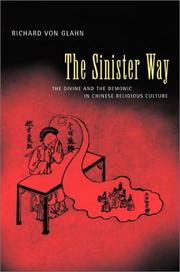| Listing 1 - 8 of 8 |
Sort by
|
Book
ISBN: 9782843625879 Year: 2016 Publisher: Dinan Terre de Brume
Abstract | Keywords | Export | Availability | Bookmark
 Loading...
Loading...Choose an application
- Reference Manager
- EndNote
- RefWorks (Direct export to RefWorks)
Book
ISBN: 9781565914278 1565914279 Year: 2014 Publisher: Seoul : Hollym,
Abstract | Keywords | Export | Availability | Bookmark
 Loading...
Loading...Choose an application
- Reference Manager
- EndNote
- RefWorks (Direct export to RefWorks)
Ghost stories. --- Ghost stories. --- Goblins --- Goblins. --- Korea.

ISBN: 3803006570 Year: 2005 Publisher: Tübingen Wasmuth
Abstract | Keywords | Export | Availability | Bookmark
 Loading...
Loading...Choose an application
- Reference Manager
- EndNote
- RefWorks (Direct export to RefWorks)
Art, Korean --- Decoration and ornament --- Goblins in art --- Themes, motives
Book
Year: 1894 Publisher: London D. Nutt
Abstract | Keywords | Export | Availability | Bookmark
 Loading...
Loading...Choose an application
- Reference Manager
- EndNote
- RefWorks (Direct export to RefWorks)
Pygmies; Dwarfs; Fairies
Book
ISBN: 0486800350 9780486800356 Year: 2016 Publisher: New York : Dover Publications,
Abstract | Keywords | Export | Availability | Bookmark
 Loading...
Loading...Choose an application
- Reference Manager
- EndNote
- RefWorks (Direct export to RefWorks)
Yōkai (Japanese folklore). --- Monsters in art. --- Goblins in art. --- Goblins in art. --- Monsters in art. --- Yōkai (Japanese folklore). --- Toriyama, Sekien, --- Toriyama, Sekien, --- Toriyama, Sekien,
Book
ISBN: 9780520271029 9780520271012 9780520959125 0520271017 0520271025 0520959124 Year: 2015 Publisher: Oakland, California
Abstract | Keywords | Export | Availability | Bookmark
 Loading...
Loading...Choose an application
- Reference Manager
- EndNote
- RefWorks (Direct export to RefWorks)
Monsters, ghosts, fantastic beings, and supernatural phenomena of all sorts haunt the folklore and popular culture of Japan. Broadly labeled 'yokai, ' these creatures come in infinite shapes and sizes, from tengu mountain goblins and kappa water spirits to shape-shifting foxes and long-tongued ceiling-lickers. Currently popular in anime, manga, film, and computer games, many yokai originated in local legends, folktales, and regional ghost stories. Drawing on years of research in Japan, Michael Dylan Foster unpacks the history and cultural context of yokai, tracing their roots, interpreting their meanings, and introducing people who have hunted them through the ages. In this delightful and accessible narrative, readers will explore the roles played by these mysterious beings within Japanese culture and will also learn of their abundance and variety through detailed entries, some with original illustrations, on more than fifty individual creatures. The Book of Yokai provides a lively excursion into Japanese folklore and its ever-expanding influence within global popular culture. It invites readers to examine how people create, transmit, and collect folklore, and how they make sense of the mysteries in the world around them. By exploring yokai as a concept, we can better understand broader processes of tradition, innovation, storytelling, and individual and communal creativity"--Provided by publisher
Yōkai (Japanese folklore) --- J1723.80 --- J5620 --- Japan: Religion in general -- demonology --- Japan: Literature -- folk tales, fairy tales, mukashibanashi, ghost stories --- Folklore --- Monsters --- Yōkai (Japanese folklore). --- SOCIAL SCIENCE --- Ungeheuer. --- Dämon. --- Volksglaube. --- Yōkai. --- Mythologie japonaise. --- Folktro. --- Folklore & Mythology. --- Japan. --- Japon. --- ancient folktales. --- anime. --- anthropology. --- asian mythology. --- concept of yokai. --- cultural reference. --- film. --- historical context. --- japanese folklore. --- japanese history. --- kappa water spirit. --- kitsune. --- long tongued ceiling licker. --- manga. --- monster guide. --- mountain goblins. --- shape-shifting foxes. --- yokai.

ISBN: 9786612356834 0520928776 1282356836 1597349011 9780520928770 141752555X 9781417525553 0520234081 9780520234086 Year: 2004 Publisher: Berkeley University of California Press
Abstract | Keywords | Export | Availability | Bookmark
 Loading...
Loading...Choose an application
- Reference Manager
- EndNote
- RefWorks (Direct export to RefWorks)
The most striking feature of Wutong, the preeminent God of Wealth in late imperial China, was the deity's diabolical character. Wutong was perceived not as a heroic figure or paragon of noble qualities but rather as an embodiment of humanity's basest vices, greed and lust, a maleficent demon who preyed on the weak and vulnerable. In The Sinister Way, Richard von Glahn examines the emergence and evolution of the Wutong cult within the larger framework of the historical development of Chinese popular or vernacular religion-as opposed to institutional religions such as Buddhism or Daoism. Von Glahn's study, spanning three millennia, gives due recognition to the morally ambivalent and demonic aspects of divine power within the common Chinese religious culture.
Demonology --- Demonology, Christian --- Demons --- Evil spirits --- Spirits --- Spiritual warfare --- History. --- China --- Religion. --- afterlife. --- ancestors. --- ancient china. --- china. --- chinese history. --- chinese jia jiao. --- chinese religion. --- christianity. --- comparative religions. --- cult. --- death. --- deity. --- demon. --- demonic. --- demonology. --- demons. --- divine power. --- divinity. --- folk belief. --- folk religion. --- folklore. --- ghosts. --- goblins. --- god of wealth. --- gods. --- greed. --- han cult. --- imperial china. --- lust. --- nonfiction. --- popular religion. --- possession. --- religion. --- religious culture. --- salvific religion. --- shanxiao. --- sin. --- spirit of the dead. --- spirituality. --- supernatural. --- vernacular religion. --- vice. --- wutong cult. --- wutong.
Book
ISBN: 1282772473 9786612772474 0520942671 9780520942677 0520253612 9780520253612 0520253620 9780520253629 9780520253612 9780520253629 Year: 2009 Publisher: Berkeley University of California Press
Abstract | Keywords | Export | Availability | Bookmark
 Loading...
Loading...Choose an application
- Reference Manager
- EndNote
- RefWorks (Direct export to RefWorks)
Water sprites, mountain goblins, shape-shifting animals, and the monsters known as yôkai have long haunted the Japanese cultural landscape. This history of the strange and mysterious in Japan seeks out these creatures in folklore, encyclopedias, literature, art, science, games, manga, magazines, and movies, exploring their meanings in the Japanese cultural imagination and offering an abundance of valuable and, until now, understudied material. Michael Dylan Foster tracks yôkai over three centuries, from their appearance in seventeenth-century natural histories to their starring role in twentieth-century popular media. Focusing on the intertwining of belief and commodification, fear and pleasure, horror and humor, he illuminates different conceptions of the "natural" and the "ordinary" and sheds light on broader social and historical paradigms-and ultimately on the construction of Japan as a nation.
Animals, Mythical --- Supernatural. --- Spirits. --- Invisible world --- Supernatural --- Fear of spirits --- Religion --- Miracles --- Creatures, Fabled --- Fabled creatures --- Fabulous animals --- Fabulous creatures --- Fantastic animals --- Fictitious animals --- Imaginary animals --- Legendary animals --- Mythical animals --- Zoological mythology --- Animals --- Dragons --- Mythology --- Japan --- al-Yābān --- Giappone --- Government of Japan --- Iapōnia --- I︠A︡ponii︠a︡ --- Japam --- Japani --- Japão --- Japon --- Japonia --- Japonsko --- Japonya --- Jih-pen --- Mư̄ang Yīpun --- Nihon --- Nihon-koku --- Nihonkoku --- Nippon --- Nippon-koku --- Nipponkoku --- Prathēt Yīpun --- Riben --- State of Japan --- Yābān --- Yapan --- Yīpun --- Zhāpān --- Япония --- اليابان --- يابان --- 日本 --- 日本国 --- Spirits --- J1723.80 --- J1723 --- J4120 --- J4150 --- J5620 --- Japan: Religion in general -- demonology --- Japan: Religion in general -- primitive religions -- general popular beliefs and folk religion --- Japan: Sociology and anthropology -- social psychology and social-cultural phemomena --- Japan: Sociology and anthropology -- customs, folklore and culture --- Japan: Literature -- folk tales, fairy tales, mukashibanashi, ghost stories --- Japan: Sociology and anthropology -- social psychology and social-cultural phenomena --- Jepun --- Yapon --- Yapon Ulus --- I︠A︡pon --- Япон --- I︠A︡pon Uls --- Япон Улс --- ayakashi. --- belief. --- commodification. --- demons. --- east asian cultural studies. --- horror. --- human electricity. --- humor. --- japan. --- japanese cultural imagination. --- japanese culture. --- japanese folklore. --- kanji. --- kokkuri. --- malevolent. --- mamono. --- minzokugaku. --- mischievous. --- mizuki shigeru. --- modernity. --- mononoke. --- monsters. --- mountain goblins. --- natural history. --- shape shifting animals. --- spirits. --- spooky stories. --- supernatural monsters. --- toriyama sekien. --- water sprites. --- yokai.
| Listing 1 - 8 of 8 |
Sort by
|

 Search
Search Feedback
Feedback About UniCat
About UniCat  Help
Help News
News